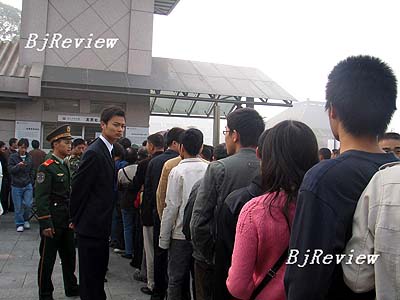| 
We Need More Sleep
It was reported that insomnia or the lack of sleep is not only a medical problem but also a social problem in present-day China. Studies show that half of the Chinese population doesn't get adequate amounts of sleep. In most cases this is because of heavy pressure from study, work and making a living.
Many workers have to work overtime to finish their jobs before the deadline and a large number of white collar workers have no regular schedule for sleep either. Those who suffer most from the shortage of sleep, however, are young students in primary and middle schools. Scientists suggest that adolescents should be provided 9 hours and 45 minutes for sleep every day, but actually Chinese students have much less sleep time because of heavy learning pressure, especially those who are preparing for tests for admission to higher-level schools.
Insomnia and the shortage of sleep are now common problems across the country and the consequences might be very serious. To ensure young students get enough sleep, education authorities must take effective measures as soon as possible to reduce the workload students shoulder. Social and labor security departments should do a tangible job to safeguard the rights of workers to rest and leisure as well.
Sanqin Metropolis Daily
Culture Hunger
After the Hubei Provincial Museum in central China first announced its free admission policy, every day it received more than 10,000 visitors, 10 times more than previous figures. Now it remains steady at about 5,000.
For years, high ticket fares have kept citizens away from public cultural venues. What happened to the Hubei Provincial Museum shows that people's demand is far from being satisfied.
At present, China's public cultural institutions operate largely on ticket income. However, unlike other sectors, such institutions are supposed to be non-profit facilities whose operation should rely on stable government subsidies, even under the market economy system.
With economic growth, "inadequate finance" can no longer justify some local governments' refusal to subsidize public cultural institutions. In many places, even if local fiscal revenues run very well, few money will be "wasted" on cultural institutions, as they are believed unable to prove how well the local economy is doing. To a large extent, the problem does not lie in money, but in the lack of a stable financial basis.
Culture is also an important part of people's lives, so it's hoped that in the coming years, the public can enjoy more free admission into cultural places such as museums.
Workers' Daily
Caring Knows No Limits
According to newly issued regulations on fellowships, state subsidies to impoverished university students will rise from an annual average of 1,500 yuan ($200) to 3,000 yuan ($400) as of 2008.
When education costs are jumping, it's encouraging that the state has raised its aid fund to impoverished students by 100 percent. But obviously, this amount is still not high enough, given that the current per-capita income of farmers is no more than 3,000 yuan while the tuition and boarding fees amount to at least 10,000 yuan ($1,350).
To make the state fellowship system work more effectively, there must be explicit and rigid criteria regarding qualifications, such as the annual family income for students to get it.
Apart from state subsidies, universities should take on more responsibility. They are expected to promote social equality as non-profit institutions, but should never add to the current inequality by always trying to make money.
At the current stage, most of the fellowships are provided by the state while universities do little to assist in the funding. This system worked in the planned economy age, as at that time, the state paid all school fees for college students. Now it's different and it's necessary for the universities to do something for the poor.
Modern Express
Justice Speaks Louder
Coalmine accidents are tragic for miners and their families, so it is always hoped that incidents are properly handled as soon as possible to minimize the emotional impact of these disasters on society.
However, it has been found that two years after the explosion at the Qitaihe Mine in northeast China's Heilongjiang Province in 2005, which claimed 171 lives, the investigation remained unfinished. If without the intervention by Li Yizhong, Minister of the State General Administration of Work Safety, maybe this case would have ended with no results. The 171 miners killed and their families might never see that justice is done.
People can't help asking that since an incident as serious as the Qitaihe explosion was so poorly treated, how many "less serious" incidents are kicked around among relevant departments? Maybe that's why the public does not want to use laws to protect themselves when their rights and interests are violated and why villains dare to offend others and also the state' s interests.
In the effort to build a human-oriented harmonious society, it's quite important for the authorities to take these incidents seriously, so as to build a safer working environment and a fairer social environment.
Guangzhou Daily
| 